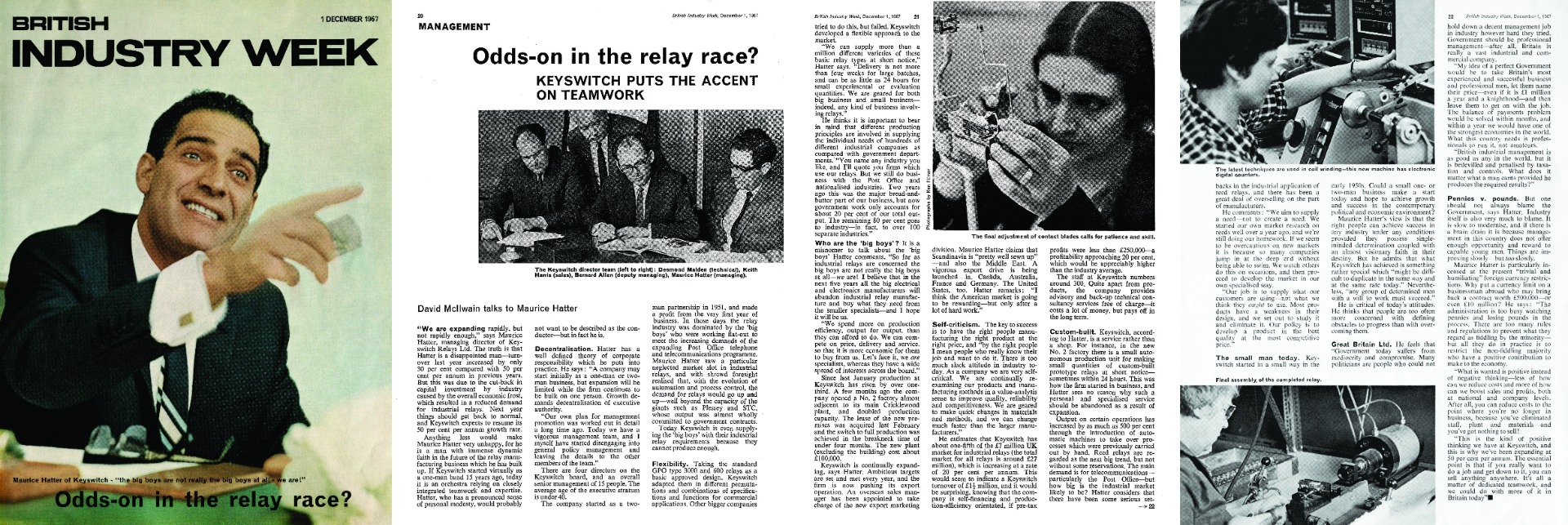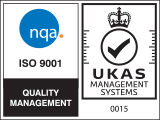An insightful article from British Industry Week, 1967, on Maurice Hatter, founder of Keyswitch Relays Ltd (now IMO Precision Controls), highlights timeless business principles that resonate with the ethos embraced by IMO Precision Controls today.
Written 57 years ago, the parallels between Hatter’s business philosophy and IMO's current strategy show that these principles are not only enduring but essential to thriving in today’s competitive market.
Which of these key drivers do you believe is still critical for today’s environment? Hatter’s emphasis on decentralized leadership underscores a critical aspect of business growth—scaling is only possible when teams are empowered to lead and innovate. This approach mirrors the leadership structure at IMO, where decision-making and creative problem-solving are driven at every level, fueling the company’s rapid expansion. His focus on adaptability and flexibility—creating custom solutions for unique market demands—remains highly relevant, IMO continues to prioritize tailored, precision-engineered solutions across multiple industries, ensuring products meet exact customer specifications with speed and reliability. At the heart of Hatter’s philosophy was the belief that dedicated teamwork and a positive outlook drive business success. This aligns with IMO’s own collaborative approach, where teams work hand-in-hand with clients to provide the best in engineering and customer support, ensuring continuous growth and value creation.
Below you will find the full article and the original documentation from British Industry Week, 1st December 1967

Odds-on in the relay race?
Keyswitch puts the accent on teamwork
David McIlwain talks to Maurice Hatter
"We are expanding rapidly, but not rapidly enough," says Maurice Hatter, managing director of Keyswitch Relays Ltd. The truth is that Hatter is a disappointed man—turnover last year increased by only 30 percent compared with 50 percent per annum in previous years. But this was due to the cutback in capital investment by industry, caused by the overall economic frost, which resulted in a reduced demand for industrial relays.
Next year, things should get back to normal, and Keyswitch expects to resume its 50 percent per annum growth rate.
Anything less would make Maurice Hatter very unhappy, for he is a man with immense dynamic faith in the future of the relay manufacturing business, which he has built up. If Keyswitch started virtually as a one-man band 15 years ago, today it is an orchestra relying on closely integrated teamwork and expertise.
Hatter, who has a pronounced sense of personal modesty, would probably not want to be described as the conductor—but in fact, he is.
Decentralisation
Hatter has a well-defined theory of corporate responsibility, which he puts into practice. He says: "A company may start initially as a one-man or two-man business, but expansion will be limited while the firm continues to be built on one person. Growth demands decentralisation of executive authority.
"Our own plan for management promotion was worked out in detail a long time ago. Today we have a vigorous management team, and I myself have started disengaging into general policy management and leaving the details to the other members of the team."
There are four directors on the Keyswitch board and an overall senior management of 15 people. The average age of the executive stratum is under 40.
The company started as a two-man partnership in 1951 and made a profit from the very first year of business. In those days, the relay industry was dominated by the "big boys" who were working flat-out to meet the increasing demands of the expanding Post Office telephone and telecommunications programme.
Maurice Hatter saw a particular neglected market slot in industrial relays and, with shrewd foresight, realised that with the evolution of automation and process control, the demand for relays would go up and up—well beyond the capacity of the giants such as Plessey and STC, whose output was almost wholly committed to government contracts.
Today, Keyswitch is even supplying the "big boys" with their industrial relay requirements because they cannot produce enough.
Flexibility
Taking the standard GPO type 3000 and 600 relays as a basic approved design, Keyswitch adapted them in different permutations and combinations of specifications and functions for commercial applications. Other bigger companies tried to do this but failed. Keyswitch developed a flexible approach to the market.
"We can supply more than a million different varieties of these basic relay types at short notice," Hatter says. "Delivery is not more than four weeks for large batches and can be as little as 24 hours for small experimental or evaluation quantities. We are geared for both big business and small business—indeed, any kind of business involving relays."
He thinks it is important to bear prices in mind while supporting the individual needs of hundreds of different industrial companies compared with government departments. "You name any industry you like, and I'll quote you firms which use our relays. But we still do business with the Post Office and nationalised industries. Two years ago, this was the major bread-and-butter part of our business, but now government work only accounts for about 20 percent of our total output—across 105 separate industries."
Who are the 'big boys'?
"It is a misnomer to talk about the 'big boys,'" Hatter comments. "So far as industrial relays are concerned, the big boys are not really the big boys at all—we are! I believe that in the next five years, all the big electrical and electronics manufacturers will abandon industrial relay manufacture and buy what they need from the smaller specialists—and I hope it will be us.
"We spend more on production efficiency, output for output, than they can afford to do. We can compete on price, delivery, and service, so that it is more economic for them to buy from us. Let's face it, we are the experts."
Since last January, production at Keyswitch has risen by over one-third. A few months ago, the company opened a No. 2 factory almost adjacent to its main Cricklewood site and doubled production capacity. The lease of the new premises was acquired last February, and the switch to full production was achieved in the breakneck time of under four months. The new plant (excluding the building) cost about £100,000.
Keyswitch is continually expanding, says Hatter. Ambitious targets are set and met every year, and the firm is now pushing its export operation. An overseas sales manager has been appointed to take charge of the new export marketing division. Maurice Hatter claims that Scandinavia is "pretty well sewn up"—and also the Middle East. A vigorous export drive is being launched in Canada, Australia, France, and Germany. The United States, too, Hatter remarks: "I think the American market is going to be rewarding but only after a lot of hard work."
Self-criticism
The key to success is to have the right people manufacturing the right product at the right price, and "by the right people, I mean people who really know their job and want to do it. There is too much slack attitude in industry today. As a company, we are very self-critical. We are continually re-examining our products and manufacturing methods in a value-analysis sense to improve quality, reliability, and competitiveness. We are geared to make quick changes in materials and methods, and we can change much faster than the larger manufacturers."
He estimates that Keyswitch has about one-fifth of the £27 million UK market for industrial relays (the total market for all relays is around £87 million), which is increasing at a rate of 20 percent per annum. This would seem to indicate a Keyswitch turnover of £5 million, and it would be surprising, knowing that the company is self-financing and production-efficiency orientated, if pre-tax profits were less than £250,000—a profitability approaching 20 percent, which would be appreciably higher than the industry average.
The staff at Keyswitch numbers around 300. Quite apart from products, the company provides advisory and back-up technical consultancy services free of charge. It costs a lot of money, but pays off in the long term.
Custom-built
Keyswitch, according to Hatter, is a service rather than a shop. For instance, in the new No. 2 factory, there is a small autonomous production unit for making small quantities of custom-built prototype relays at short notice—sometimes within 24 hours. This was how the firm started in business, and Hatter sees no reason why such a personal and specialised service should be abandoned as a result of expansion.
Output on certain operations has increased by as much as 300 percent through the introduction of automatic machines to take over processes that were previously carried out by hand. Reed relays are regarded as the next big trend, but not without some reservations. The main demand is for telecommunications—particularly the Post Office—but how big is the industrial market likely to be? Hatter considers that there have been some serious setbacks in the industrial application of reed relays, and there has been a great deal of overselling on the part of manufacturers.
He comments: "We aim to supply a need—not to create a need. We started our own market research on reeds well over a year ago, and we're still doing our homework. If we seem to be overcautious on new markets, it is because so many companies jump in at the deep end without being able to swim. We watch others do this on occasions and then proceed to develop the market in our own specialised way.
"Our job is to supply what our customers are using—not what we think they ought to use. Most products have a weakness in their design, and we set out to study it and eliminate it. Our policy is to develop a product of the best quality at the most competitive price."
The small man today
Keyswitch started in a small way in the early 1950s. Could a small one- or two-man business make a start today and hope to achieve growth and success in the contemporary political and economic environment?
Maurice Hatter's view is that the right people can achieve success in any industry under any conditions provided they possess single-minded determination coupled with an almost visionary faith in their destiny. But he admits that what Keyswitch has achieved is something rather special, which "might be difficult to duplicate in the same way and at the same rate today." Nevertheless, "any group of determined men with a will to work must succeed."
He is critical of today's attitudes to small businessmen. "Too much time and money is spent on unproductive exercises like advertising and short-term contracts," Hatter says. "There is too much emphasis on the 'mystique' of big business. And it is not just a question of skill and success—when is the world going to realise that a man earns so long as he produces?"
He also claims that the whole system of rating profits is wrong. "Profit is not something wicked—industry can never hope to expand without profit. The structure of industry must be changed to reward results, not effort, and the whole purpose of commerce must be oriented towards earning money."
He concludes: "Industry must get the Government it deserves. It is the single most important factor in British life today."



